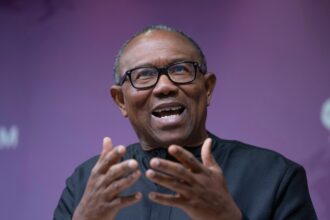Osinbajo and Nigeria’s delegate left early Thursday for Accra, Ghana, to attend the Extraordinary Summit of the ECOWAS Authority of Heads of State and Government.
Burkina Faso became the third member of the 15-nation Economic Community of West African States (ECOWAS) to be overtaken by the military on January 24, prompting emergency talks in Ghana’s capital Accra.
ATTENTION: Click “HERE” to join our WhatsApp group and receive News updates directly on your WhatsApp!
Burkina Faso followed Mali, where a September 2020 coup was followed by a May 2021 coup, and Guinea, where elected president Alpha Conde was deposed last September.
A gun attack on Guinea-president, Bissau’s Umaro Sissoco Embalo, on Tuesday fueled fears that years of efforts to steer West Africa toward stability and democracy were failing.
The one-day meeting, which begins at 1000 GMT on Thursday, will assess the outcomes of two missions to Burkina following the coup.
Burkina Faso was expelled from ECOWAS after rebel soldiers detained President Roch Marc Christian Kabore, sparking public outrage over his handling of a jihadist insurgency.
The question now is whether the country, which is ranked 182nd out of 189 in the UN’s global development index, will escape economic punishment.
ECOWAS has already imposed crippling sanctions on Mali and Guinea for failing to follow through on their commitments to restore civilian rule.
These measures have included border closures by ECOWAS members, an embargo on trade and financial transactions, and individual sanctions.
On Saturday, ECOWAS military chiefs flew to Ouagadougou for talks with the junta, and on Monday, a diplomatic mission led by Ghana’s foreign minister, Shirley Ayorkor Botchwey, arrived.
The envoys’ initial reactions have been positive.
“They appeared to be very open to our suggestions and proposals.”
“It’s a good sign for us,” Botchwey said after meeting with junta leader Lieutenant-Colonel Paul-Henri Sandaogo Damiba and other junta members.
The UN Special Representative for West Africa and the Sahel (UNOWAS), Mahamat Saleh Annadif, attended the talks, which he described as a “very frank exchange.”
The delegation met with Kabore, whose health and demand for release from house arrest are major concerns.
During the visit, the junta declared that it had restored the constitution, which it had quickly suspended after the coup, and named Damiba as president and head of the armed forces during a transition period.
On Tuesday, Damiba met with political party leaders, many of whom expressed a desire to participate in the restoration of civilian rule.
However, major questions remain unanswered, including the crucial issue of election timing. On January 24, the junta promised to restore “constitutional order” in a “reasonable time.”
In deciding whether to impose sanctions, ECOWAS leaders must weigh the credibility of their organization against the vulnerability of some of their member states, particularly those in the Sahel.
Mali and Burkina Faso are in the grip of a nearly decade-long jihadist insurgency that has claimed thousands of lives and displaced at least 1.5 million people.
Escalating political tensions with Mali’s junta have pushed Bamako closer to the Kremlin, casting a shadow over France’s anti-jihadist mission in the country.

